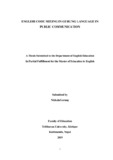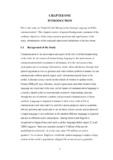Please use this identifier to cite or link to this item:
https://elibrary.tucl.edu.np/handle/123456789/1036| Title: | English Code Mixing in Gurung Language in Public Communication |
| Authors: | Gurung, Nirkala |
| Keywords: | English;Language;Communication |
| Issue Date: | 2019 |
| Publisher: | Central Department of English Education |
| Abstract: | The study entitled English Code-mixing in Gurung Language in Public Communicationis an attempt to find out the English Mixed words in the Gurung language in public communication. The objectives of the study are to find out the English word mixing in Gurung language in public communication, to find out the major causes of English code mixing in the Gurung language and to suggest pedagogical implication on the basis of the finding of this study. I used stratified random sampling procedure to select sixty respondents from Gurung community in Tanahu district. I carried out interview including both close and open-ended questions and went through the observations there I kept audio record of their communication as the research tool. The major findings of the research showed that word level English code-mixing inGurunglanguage was used in greater number in comparison to other linguistic units.Use of mono-morphemic words werefound in the highest number, regarding the structure of mixed words. English language sentences were mixed in Gurung language only by educated people. Only simple sentences were mixed in the expressions which were remarked in the lowest position.Educated people mixed more technical codes i.e. automobile, techniques, systems, etc. than illiterate and literate people. The mixing of English words was found to be natural for educated speakers.It was found that new and technical topic demands for the maximum use of English words rather than other topic. The main reasons behind the mixing codes in their language was automaticity, choice of topic, English language learners, fashion of using English language and domination of English language. Also the influence of science and technology like radio, TV, computer and foreign employment etc. This thesis consists of five chapters.The first chapter introduces background of the study, statement of the problem, objectives of the study, research questions, significance of the study and delimitations of the study and operational definitions of the key terms. The second chapter deals with the review of the theoretical literature, review of related empirical literature, implications of the review for the study and conceptual framework for the study. The third chapter incorporates design and method of the study, population, sample and sampling strategy, research tools, sources of data, data collection tool, data collection procedures, data analysisand interpretation procedures and ethical considerations. The fourth chapter deals with the analysis and interpretation of data. The fifth chapter presents the findings, conclusion and recommendations of this research in different areas such as policy related, practice related and further research related. References and appendices are included in concluding part of the thesis. |
| URI: | http://elibrary.tucl.edu.np/handle/123456789/1036 |
| Appears in Collections: | Finance |
Files in This Item:
| File | Description | Size | Format | |
|---|---|---|---|---|
| Cover.pdf | 40.04 kB | Adobe PDF |  View/Open | |
| CHAPTER.pdf | 184.04 kB | Adobe PDF |  View/Open |
Items in DSpace are protected by copyright, with all rights reserved, unless otherwise indicated.
